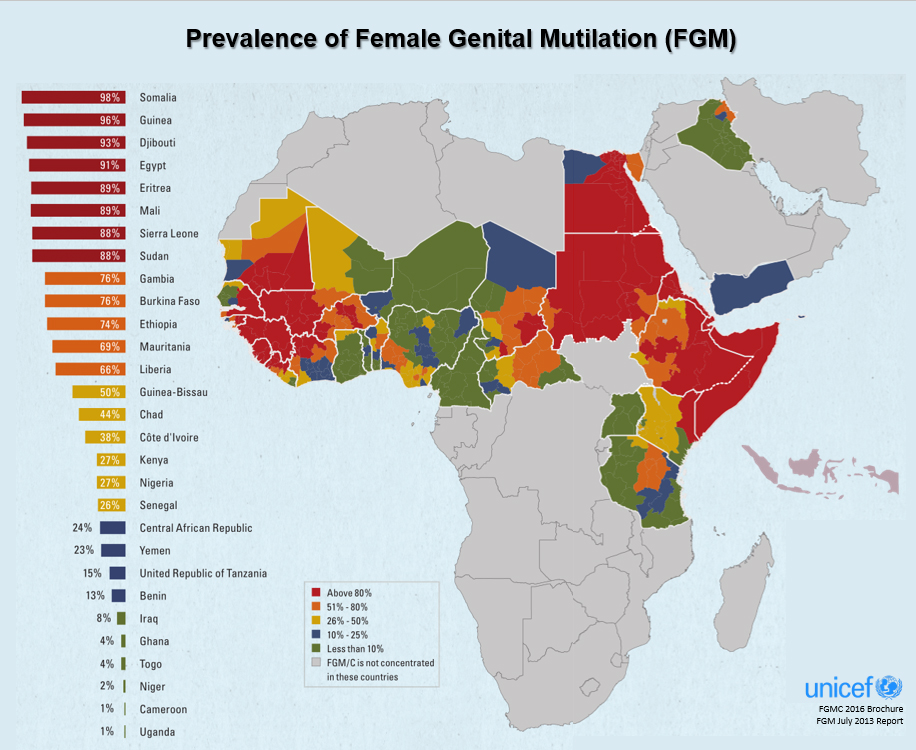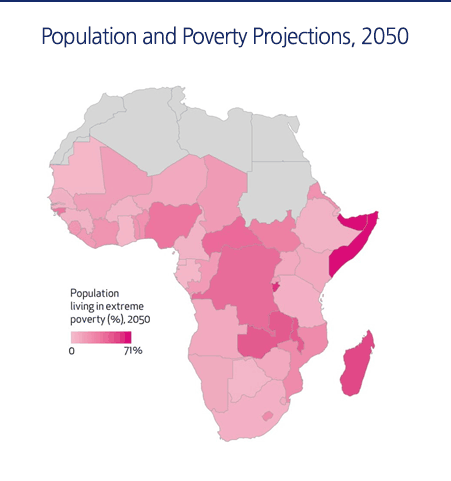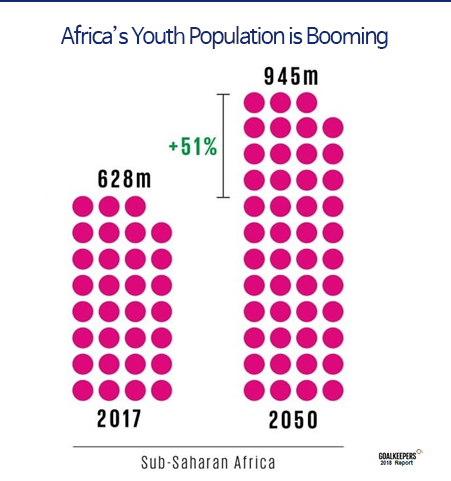2019Laureate
Announcement
- Date
- November 22, 2018
- Location
- Cape Town International Convention Center, Cape Town, South Africa
Laureate Announcement Video

Making the World Better for Future Generations
The Sunhak Peace Prize was established based upon the vision of “One Family Under God,” promoted by the founders, Rev. Sun Myung Moon and Dr. Hak Ja Han Moon, to bring peaceful future for humanity. Today, we are facing intensifying problems caused by global inequality. In this era, international effort is necessary to pave a peaceful path for humanity’s future.
The Sunhak Peace Prize Committee takes pleasure in announcing that the Sunhak Peace Prize for 2019 is to be awarded to Waris Dirie, for her major contribution to empowering rights of girls and women in Africa by leading the campaign to eradicate Female Genital Mutilation (FGM), and to Dr. Akinwumi Ayodeji Adesina, for presenting the vision of Good Governance of Africa which leads Africa to feed itself by implementing innovative agricultural policies. Both laureates have made significant contributions to upholding the human rights of Africans and raising the quality of lives for the people of Africa.
Waris Dirie was the first person in history to publicize to the world, the violence of FGM and saved millions of lives by taking a leading role in promoting anti-FGM campaign. She raised the issue of FGM as an international human rights agenda and assisted in passing a worldwide resolution banning its practice.
Born into a goat-herding nomad family in Somalia, she underwent female circumcision at the age of 5. In 1997, when her career as a world-class supermodel was at its peak, she revealed her experience with FGM as a representative of all African girls and women who had undergone the procedure and couldn’t tell anyone their story. From this bold start, she made a commitment to stop the practice from being passed down to the next generation. Her outspokenness awoke people around the world to the reality, that FGM has nothing to do with religious or cultural tradition. In fact, it can lead to death, which violates human rights and humanity. Her declaration was a bold act toward the eradication of this violent practice.
After her brave declaration, Waris Dirie was appointed as the first Special Ambassador to the United Nations for the Elimination of Female Genital Mutilation. In 2002, she established the Desert Flower Foundation to raise the FGM issue as a topic of global discussion, instead of restricting it to the frame of a personal issue. The foundation implemented systematic methods and solutions to protect the human rights of victims and those who are at the risk of undergoing FGM.
As a result of her many efforts in international communities, the world started comprehending FGM as a form of violence. This led 15 African Union member countries to ratify the Maputo Protocol in 2003, which lists FGM as a harmful practice that must be ended. In 2012, the United Nations General Assembly unanimously passed a resolution banning the practice of FGM and the UN has set a goal to eliminate FGM by 2030. These decisions by the African Union and the United Nations are a tribute to the work of Waris Dirie.
As an agricultural economist, Dr. Akinwumi Adesina has been a leading agricultural innovator for over 30 years, bringing tremendous improvement in food security, and his excellent leadership is building stepping-stones for Africa’s dynamic growth.
Dr. Adesina, who is originally from Nigeria, pioneered a major transformation in the agricultural field. His achievements include expanding rice production by introducing high yielding technologies, designing and implementing policies to support farmers’ access to technologies at scale, increasing the availability of credit for millions of smallholder farmers, attracting private investments for the agricultural sector, rooting out the corrupt elements in the fertilizer industry, and assisting in establishment of major agricultural policies for Africa’s green revolution, to increase the competitiveness of smallholder farmers in Africa.
In particular, the Africa Fertilizer Summit, which he organized in 2006, was one of the largest high-level meetings in history to focus on solving Africa’s food issues. Dr. Adesina succeeded in raising excitement and political will among the leaders at the summit and was instrumental in the adoption of the Abuja Declaration on Fertilizer for the African Green Revolution, in which all the leaders stated their commitment toward the “eradication of hunger in Africa by 2030.”
In addition, Dr. Adesina passionately cooperated with banks in other countries and international NGOs to create an innovative financing system which led banks to extend credit and loans to smallholder farmers, who had no other ways to get out of the cycle of poverty. This move leveraged $100 million of loans and gave smallholder farmers the opportunity to rise in the agricultural industry.
Dr. Adesina currently serves as the president of the African Development Bank, and he is spearheading the inclusive growth of Africa for Africa’s development. As an “economic commander” of Africa, he is leading Africa’s growth with the “High 5 Strategy,” which includes: light up and power Africa, feed Africa, industrialize Africa, integrate Africa and improve the quality of life for the people of Africa. The Bank estimate shows that 4.4 million people were able to connect to electricity, 8.5 million people received benefits in the agricultural field and 14 million people from the transportation field.
The Sunhak Peace Prize presents a Peace Agenda for the Future to guide the global community on a peaceful path. For the 2019 Sunhak Peace Prize, the Sunhak Committee has declared “Africa’s human rights and human development” as the Peace Agenda for the Future.
In order for us to build an era of peace and coexistence in the 21st century, we have to bring Africa’s development and human rights issues to the world’s consciousness and solve these issues together, as a global family. We can accelerate the transformation of Africa with the combined efforts and good will of humankind.
The laureates of the 2019 Sunhak Peace Prize represent an enduring definition of peace. They are the “great man and woman” of this era, who have dedicated their lives to improving Africa’s human rights and human development. By studying their actions, we can realize how one person’s braveness and leadership can steer the world’s communities one step closer to world peace. The Sunhak Committee wishes that the laureates’ sacrificial journey will bring a great opportunity for people around the world, to uplift the vision of love for humankind.
Cape Town, South Africa
November 22, 2018
Dr. Il Sik Hong, Chairman, Sunhak Peace Prize Committee
Human Rights and Human Development of Africa
The Sunhak Peace Prize for 2019 is focusing on “Africa’s human rights and human development” as the Award Theme for humanity’s future. Today, we are facing intensifying problems caused by global inequality. In order for us to build an era of peace and coexistence in the 21st century, we have to bring Africa’s development and human rights issues to the world’s consciousness and solve these issues together as a global family. We can accelerate the transformation of Africa with the combined efforts and good will of humankind.
Female Genital Mutilation (FGM), a Crime and Inhumane Practice Carried out on Millions of Girls and Women
Female Genital Mutilation (FGM), or female circumcision, is a traditional ritual usually carried out on girls under the age of 10 as a symbol of purity. This operation involves cutting or removing the external female genitalia for non-medical reasons and the operated area is sewn together, leaving a tiny hole. It has been practiced over thousands of years in many countries throughout Africa and the Middle East, due to cultural or traditional reasons. This barbaric practice, which is usually done under unsanitary conditions and without anesthetics and medical tools, is an inhumane crime.
This practice often causes infertility, problems with urination, high blood loss, infections and a mortality rate up to 30 percent. According to the World Health Organization (WHO), over 200 million girls and women have been affected by FGM, which is prevalent in more than 30 countries, including many parts of Africa and the Middle East. Yearly, about 3.5 million and daily about 9,800 girls and women’s lives are threatened by the brutal practice.
By 2050, one third of the earth’s population of women will come from Africa and the Middle East, which places over 500 million girls and women at the risk of FGM. Also, due to the increase of the immigration rate, countries in Europe, North America and Asia are being affected by FGM. Therefore, worldwide effort is urgently needed.

Transforming Africa, a Land of Poverty into the Land of Opportunity
When poverty is considered, Africa is one of the poorest parts of the world. In fact, poverty is concentrated in Africa. According to Goalkeepers Report published in 2018, which is created by the Bill & Melinda Gates Foundation to accelerate progress towards the 17 Sustainable Development Goals, more than a billion people have lifted themselves from extreme poverty since 2000. However, this progress is centered in the region of China and India, resulting in extreme poverty being heavily concentrated in sub-Saharan African countries. By 2050, the population of Africa will reach 25 percent of the earth’s population, and sub-Saharan African countries are where 86 percent of the extremely poor people in the world will be concentrated, living under the extreme poverty line of $1.90 per day. In fact, if the continent's rapid population growth and economic level continue, Africa will fall into a disastrous state.
There is another concern regarding the African continent. Africa is the world’s youngest continent. Nearly 60 percent of Africans are under the age of 25, and the young population is projected to reach 840 million by 2050. The answer is simple: continuous investment and creation of opportunities for the world’s fastest-growing, poorest and youngest countries. This will greatly reduce extreme poverty in Africa, just like China and India. Also, this will advance human rights and create opportunities for African people. Africa’s young people have the potential to drive Africa’s development and growth. Continuous investment in Africa will produce activists, innovators, leaders, and workers of the future.
However, if Africa cannot lift itself from extreme poverty, the young population will fall into cycle of poverty, inequality, and unemployment, with no chance to experience development. Moreover, Africa may experience increasing violence, instability, terrorism and refugee issues, which will also bring global instability. It is time to focus the global efforts and good will of humankind on Africa.


The 2019 Sunhak Peace Prize Awarded to Waris Dirie and Dr. Akinwumi Ayodeji Adesina
● Waris Dirie: human rights activist and super-model, recognized throughout the world for her work to eliminate the practice of FGM (Female Genital Mutilation).
● Akinwumi A. Adesina: President of the African Development Bank, committed to the eradication of poverty through agricultural innovation, and promoting Good Governance through the works of developing Africa’s economy.
At the Cape Town International Convention Center, the Sunhak Peace Prize Committee announced that the 2019 Laureates for the Sunhak Peace Prize would be Waris Dirie, 58 year-old world-class supermodel and anti-FGM activist, and Dr. Akinwumi Ayodeji Adesina, 53 year-old president of the African Development Bank Group.
Waris Dirie is widely acclaimed for raising awareness throughout the world, about the tragic practice which is still prevalent in some parts of the world, Female Genital Mutilation (FGM). The Sunhak Peace Prize Committee selected Waris Dirie in recognition of her tireless advocacy for the rights of girls and women, and her call for a worldwide resolution calling for the eradication of FGM, thereby protecting girls who are at the risk of FGM.
As an agricultural economist, Dr. Akinwumi Adesina has been a leader in agricultural innovation for over 30 years. He has contributed greatly to food security in Africa, aimed at improving the lives of millions currently living in poverty, throughout the African continent. The Sunhak Committee acknowledges Dr. Akinwumi Adesina’s achievements in promoting Good Governance through the works of improving Africa’s economies and lifting millions of rural and poor farmers out of poverty.
The Sunhak Peace Prize Committee stated, that “both laureates have made a significant contribution to improving the quality of life of the most vulnerable in Africa.”
The Sunhak Peace Prize Committee recognizes the immense importance of Africa, observes that Africa is undergoing rapid change and development, while also facing challenges. These Laureates have made dramatic contributions to Africa’s growth and development.
Warisi Dirie was born into a goat-herding nomad family in Somalia. She was subjected to female circumcision at the age of 5. In 1997, when her fashion career was at its peak, as a world-class supermodel, she shared her experience with the world. She became a voice for the voiceless. Her story shocked and at the same time enlightened people around the world about the tragic reality of FGM.
After sharing her story boldly, Waris Dirie was appointed, in 1997, as the first Special Ambassador to the United Nations for the Elimination of Female Genital Mutilation. In 2002, she established the “Desert Flower Foundation,” and since that time she has travelled the world, actively leading the anti-FGM campaign, and upholding the rights of women and girls.
As a result of her efforts, 15 African Union member countries ratified the “Maputo Protocol” in 2003, which lists FGM as a harmful practice that must be ended. In 2012, the United Nations General Assembly unanimously passed a resolution banning the practice of FGM, and the UN has set a goal to eliminate FGM by 2030. These decisions by the African Union and the United Nations are a tribute to the work of Waris Dirie.
According to the World Health Organization (WHO), over 200 million girls and women have been affected by FGM, which is prevalent in more than 30 countries, including parts of Africa and the Middle East. Moreover, the practice threatens the lives of millions of girls. Also, due to the increase of the immigration rates, countries in Europe, the USA and Asia are affected by FGM practices. This barbaric practice is a crime and against humanity, which often causes infertility, problems with urination, high blood loss, infections and in some cases even death.
In 2013, Waris Dirie’s Desert Flower Foundation partnered with Waldfriede hospital and started the first Desert Flower Center to provide a comprehensive cure for victims of FGM. In 2014, Desert Flower Center started Training Center to provide FGM reconstructive surgery education to doctors and obstetricians, these centers provide reconstructive surgeries for the victims of FGM. In addition, she is at the forefront in helping victims of FGM improve their lives through “basic literacy education” and “career education.” Recently, she opened an elementary school in Sierra Leone, and launched companies in Ethiopia and Kenya to provide employment to thousands.
Dr. Akinwumi Adesina has been a leader in agricultural innovation in Africa for over 30 years, bringing significant improvements to Africa’s food security. His leadership is building stepping-stones for Africa’s dynamic growth.
Dr. Akinwumi Adesina pioneered major transformations in the agricultural field, including expanding rice production by introducing high yielding technologies, designing and implementing policies to support farmers’ access to technologies at scale, increasing the availability of credit for millions of smallholder farmers, attracting private investments for the agricultural sector, rooting out the corrupt elements in the fertilizer industry, and assisting in establishment of major agricultural policies for Africa’s green revolution.
The “Africa Fertilizer Summit,” which he organized in 2006, was one of the largest high-level meetings in history that had a focus on solving Africa’s food issues. During this Summit, Dr. Adesina was instrumental in developing the “Abuja Declaration on Fertilizer for the African Green Revolution,” whereby the participants stated their commitment to the “eradication of hunger in Africa, by 2030.”
Dr. Adesina worked with various banks and international NGOs in order to create an innovative financing system, providing loans to smallholder farmers, providing a way for them to rise out of poverty. This move leveraged $100 million in loans and provided opportunities for smallholder farmers to increase their agricultural productivity, and their income.
Dr. Akinwumi Adesina currently serves as the president of the African Development Bank Group which plays a central role in Africa’s development. As an “economic commander” of Africa, he promotes the “High 5 Strategy” that include: light up and power Africa, feed Africa, industrialize Africa, integrate Africa and improve the quality of life for the people of Africa. As a result of his work, the lives of millions of people throughout Africa have been improved.
Chairman of the Sunhak Peace Prize Committee, Dr. Il Sik Hong, stated that “the Sunhak Peace Prize was established based upon the vision of ‘One Family Under God.’ The 2019 Sunhak Peace Prize gives special attention to peace and human development in Africa.”
Dr. Hong added “in order for us to build an era of peace and coexistence in the 21st century, we want to encourage continuous development in Africa. Africa is a rising star and its growth will contribute to global progress and development throughout the 21st century.”
The Sunhak Peace Prize honors individuals and organizations who have made significant contributions to the peace and the welfare of the future generations. The Sunhak Peace Prize includes a cash prize totaling one million dollars. The 2019 Sunhak Peace Prize Award Ceremony will take place on February 11, 2019 in Seoul, Korea.
Future generations refer not only to our own physical descendants
but also to all future generations to come.
Since all decisions made by the current generation will either positively
or negatively affect them, we must take responsibility for our actions.
